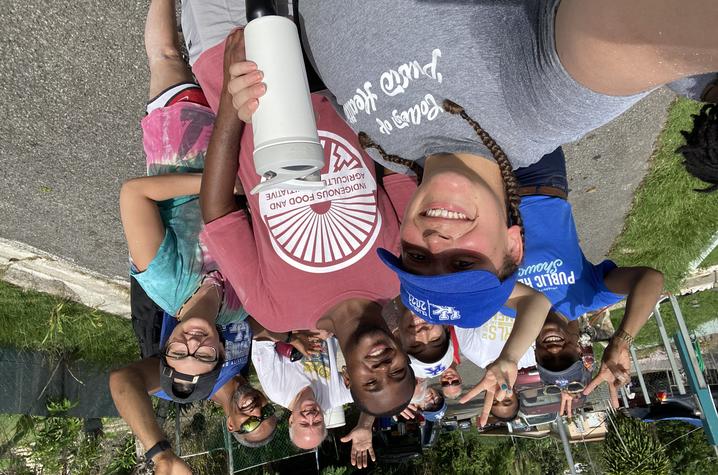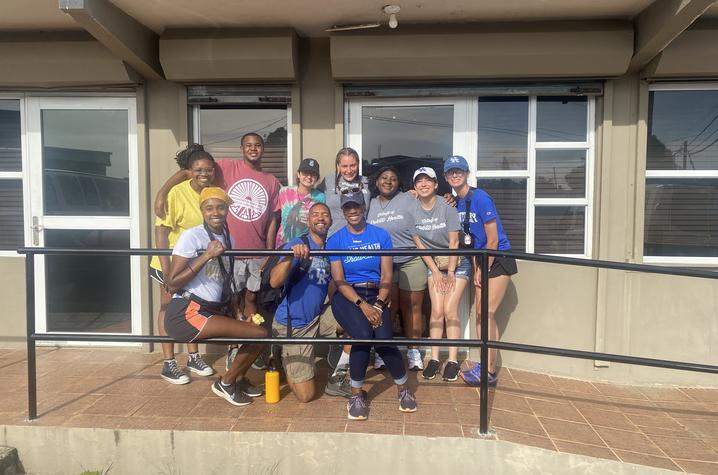Global health students provide relief work in Puerto Rico
LEXINGTON, Ky. (Oct. 19, 2023) — Ketrell McWhorter, Ph.D., is the director of the Global Health Graduate Certificate at the University of Kentucky College of Public Health (CPH). This past July, she took a group of students with her to Puerto Rico to participate in relief work in the wake of Hurricane Fiona.
The National Institutes of Health (NIH) define global health as collaborative trans-national research and action for promoting health for all. McWhorter understands that global health is an integral part of a public health student’s education, and takes her role as the only global health professor at CPH very seriously.
“Environmental issues, such as pollution or climate change, impact health on a global scale,” said McWhorter. “The hurricane that affected Puerto Rico is a poignant example of the kind of challenges that are exacerbated by global climate patterns. And although fewer people (globally and over time) die from natural disasters than they have in yesteryear, that fact has no bearing on the frequency of natural disasters. People need help in the wake of these disasters.”
The trip was through a larger missions operation, but the UK group was able to stay together. McWhorter and the students were assigned to a family’s home that had been severely damaged. The group’s job for the week was to clean out and paint the inside of the home, and to repair some damage on the roof.
Ashley Wright, currently pursuing a master’s degree in environmental health at CPH, was one of the students on the trip with McWhorter. She explained that the owners of the home they worked on were grandparents who were physically disabled. The woman could not walk on one of her legs as the result of a botched surgery, and her husband was blind.
“Even though there was a language barrier, it was easy to tell how happy and grateful they were to have us there,” said Wright. “The two of them wanted to help out with the work too, which I thought was a testament to how much they love their home.”
Wright said it took the UK team the entire five days there to get the house fully cleaned and painted.
“I was honestly a little bit scared we wouldn’t finish,” said Wright. “We finished on the very last day. Just to be a small part of their journey and to celebrate it with them was surreal.”
McWhorter was inspired to take students to Puerto Rico not only because of her passion for public health, but also because of her personal passion for service. McWhorter and her husband went to Puerto Rico for their honeymoon after marrying in 2019. They dedicated part of their trip together to service, but knew they wanted to return for a full service trip.
“It was a natural inclination to include public health students, as disaster recovery and relief in low-resource affected areas is a key public health urgency,” said McWhorter. “Also, providing experiential learning opportunities is the best way for students to really grasp Global Health concepts. I knew it would be a way to bring together public health principles with empathy from working with real people.”
With service and natural disaster experience already under her belt, McWhorter was thrilled to present her students with real-life experience. Watching them work in that environment also allowed her to reflect on what she teaches in the classroom and how she can present these lessons to students who have not yet had the opportunity for service work in the field.
Service work by nature involves a lot of unknowns; the exact environment you will be working in, the tools you will have to complete the job, how to communicate with those around you, and the list goes on. McWhorter takes those unknowns and turns them into lessons for her students.
“Since July, I now place a stronger emphasis on understanding diverse cultural contexts, sensitivity and empathy and ensuring that students are not just technically proficient but also culturally aware,” said McWhorter. “I intend to integrate more reflection sessions into my spring Global Health course, allowing students to ponder and discuss their experiences, challenges and learnings. This not only reinforces their understanding but also helps them build emotional intelligence and empathy.”
Since Puerto Rico, McWhorter’s students have come back to campus with new inspiration and motivation to do well, especially in global health.
“I feel a lot more motivated for school after the trip,” said Wright. “Instead of being annoyed I have to go to class, or annoyed I have to complete an assignment, I am thankful instead. Some people don't have the same opportunity to go to college or get an education at all, so it is just a great thing that I am able to go to a university and I am truly thankful for that.”
While McWhorter continues to educate her students on global health issues, it does not eclipse the public health problems Kentuckians face in their own backyards. Seeing health disparity on a global scale has inspired Wright to take a look at her own neighborhood, and inspired her to participate in service work to move Kentucky forward.
“The trip showcased the immense potential our students have when given the opportunity,” said McWhorter. “Their dedication, intelligence and compassion were evident every day, and it was a reminder to always create spaces for them to shine. I whole-heartedly believe Global Health opportunities must be a part of any public health curriculum, particularly experiential opportunities such as this one.”
Recently, McWhorter received new funding to study a health issue closer to home — a Diversity Supplement Grant from National Center for Advancing Translational Science, via the UK Center for Clinical and Translational Science. These grants aim to ensure that the translational science workforce is broadly representative across racial, ethnic, sex, gender, age, socioeconomic, geographic and disability status.
McWhorter has dedicated her career to understanding how early-life exposures — be they environmental, nutritional or social — impact long-term cardiometabolic outcomes. The Diversity Supplement Grant supports her project, “Impact of co-exposures on Pediatric Obesity and Sleep in Appalachian Children,” which seeks to disentangle the complex relationship between children’s exposure to secondhand smoke and air pollution, it’s impact on their sleep, and how these factors influence body weight and cardiometabolic outcomes for this rural population.
As the state’s flagship, land-grant institution, the University of Kentucky exists to advance the Commonwealth. We do that by preparing the next generation of leaders — placing students at the heart of everything we do — and transforming the lives of Kentuckians through education, research and creative work, service and health care. We pride ourselves on being a catalyst for breakthroughs and a force for healing, a place where ingenuity unfolds. It's all made possible by our people — visionaries, disruptors and pioneers — who make up 200 academic programs, a $476.5 million research and development enterprise and a world-class medical center, all on one campus.






